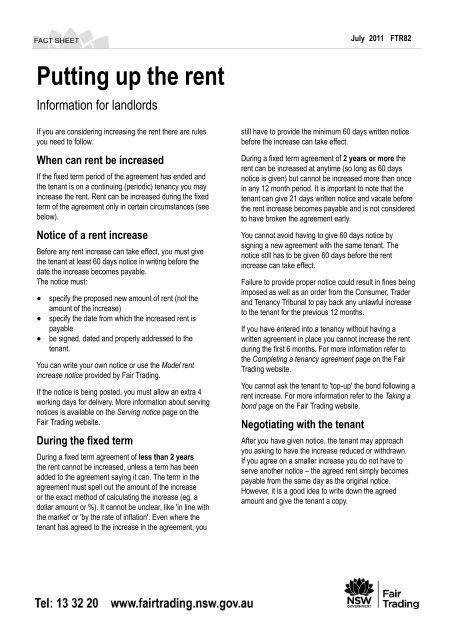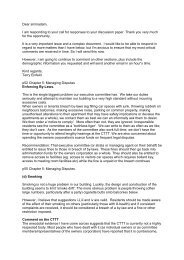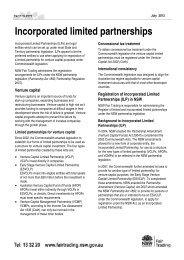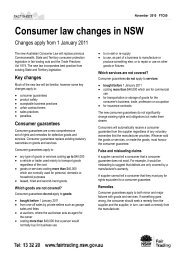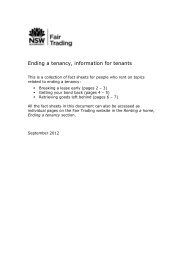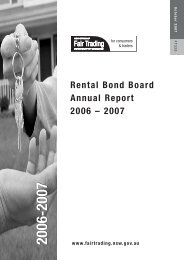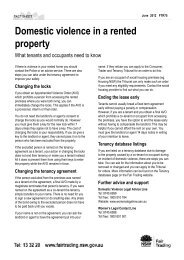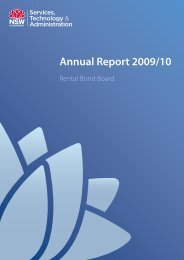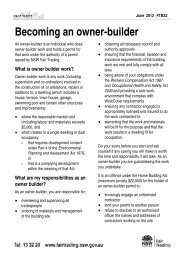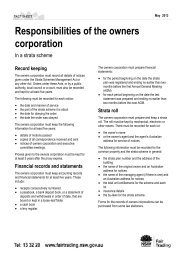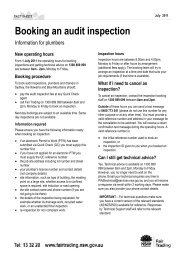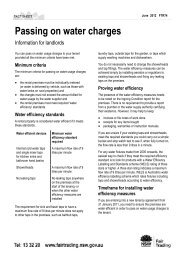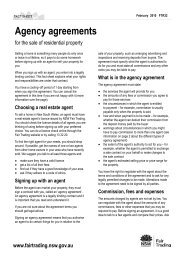Putting up the rent - NSW Fair Trading
Putting up the rent - NSW Fair Trading
Putting up the rent - NSW Fair Trading
You also want an ePaper? Increase the reach of your titles
YUMPU automatically turns print PDFs into web optimized ePapers that Google loves.
<strong>Putting</strong> <strong>up</strong> <strong>the</strong> <strong>rent</strong><br />
Information for landlords<br />
If you are considering increasing <strong>the</strong> <strong>rent</strong> <strong>the</strong>re are rules<br />
you need to follow.<br />
When can <strong>rent</strong> be increased<br />
If <strong>the</strong> fixed term period of <strong>the</strong> agreement has ended and<br />
<strong>the</strong> tenant is on a continuing (periodic) tenancy you may<br />
increase <strong>the</strong> <strong>rent</strong>. Rent can be increased during <strong>the</strong> fixed<br />
term of <strong>the</strong> agreement only in certain circumstances (see<br />
below).<br />
Notice of a <strong>rent</strong> increase<br />
Before any <strong>rent</strong> increase can take effect, you must give<br />
<strong>the</strong> tenant at least 60 days notice in writing before <strong>the</strong><br />
date <strong>the</strong> increase becomes payable.<br />
The notice must:<br />
● specify <strong>the</strong> proposed new amount of <strong>rent</strong> (not <strong>the</strong><br />
amount of <strong>the</strong> increase)<br />
● specify <strong>the</strong> date from which <strong>the</strong> increased <strong>rent</strong> is<br />
payable<br />
● be signed, dated and properly addressed to <strong>the</strong><br />
tenant.<br />
You can write your own notice or use <strong>the</strong> Model <strong>rent</strong><br />
increase notice provided by <strong>Fair</strong> <strong>Trading</strong>.<br />
If <strong>the</strong> notice is being posted, you must allow an extra 4<br />
working days for delivery. More information about serving<br />
notices is available on <strong>the</strong> Serving notice page on <strong>the</strong><br />
<strong>Fair</strong> <strong>Trading</strong> website.<br />
During <strong>the</strong> fixed term<br />
During a fixed term agreement of less than 2 years<br />
<strong>the</strong> <strong>rent</strong> cannot be increased, unless a term has been<br />
added to <strong>the</strong> agreement saying it can. The term in <strong>the</strong><br />
agreement must spell out <strong>the</strong> amount of <strong>the</strong> increase<br />
or <strong>the</strong> exact method of calculating <strong>the</strong> increase (eg. a<br />
dollar amount or %). It cannot be unclear, like 'in line with<br />
<strong>the</strong> market' or 'by <strong>the</strong> rate of inflation'. Even where <strong>the</strong><br />
tenant has agreed to <strong>the</strong> increase in <strong>the</strong> agreement, you<br />
July 2011 FTR82<br />
still have to provide <strong>the</strong> minimum 60 days written notice<br />
before <strong>the</strong> increase can take effect.<br />
During a fixed term agreement of 2 years or more <strong>the</strong><br />
<strong>rent</strong> can be increased at anytime (so long as 60 days<br />
notice is given) but cannot be increased more than once<br />
in any 12 month period. It is important to note that <strong>the</strong><br />
tenant can give 21 days written notice and vacate before<br />
<strong>the</strong> <strong>rent</strong> increase becomes payable and is not considered<br />
to have broken <strong>the</strong> agreement early.<br />
You cannot avoid having to give 60 days notice by<br />
signing a new agreement with <strong>the</strong> same tenant. The<br />
notice still has to be given 60 days before <strong>the</strong> <strong>rent</strong><br />
increase can take effect.<br />
Failure to provide proper notice could result in fines being<br />
imposed as well as an order from <strong>the</strong> Consumer, Trader<br />
and Tenancy Tribunal to pay back any unlawful increase<br />
to <strong>the</strong> tenant for <strong>the</strong> previous 12 months.<br />
If you have entered into a tenancy without having a<br />
written agreement in place you cannot increase <strong>the</strong> <strong>rent</strong><br />
during <strong>the</strong> first 6 months. For more information refer to<br />
<strong>the</strong> Completing a tenancy agreement page on <strong>the</strong> <strong>Fair</strong><br />
<strong>Trading</strong> website.<br />
You cannot ask <strong>the</strong> tenant to 'top‑<strong>up</strong>' <strong>the</strong> bond following a<br />
<strong>rent</strong> increase. For more information refer to <strong>the</strong> Taking a<br />
bond page on <strong>the</strong> <strong>Fair</strong> <strong>Trading</strong> website.<br />
Negotiating with <strong>the</strong> tenant<br />
After you have given notice, <strong>the</strong> tenant may approach<br />
you asking to have <strong>the</strong> increase reduced or withdrawn.<br />
If you agree on a smaller increase you do not have to<br />
serve ano<strong>the</strong>r notice – <strong>the</strong> agreed <strong>rent</strong> simply becomes<br />
payable from <strong>the</strong> same day as <strong>the</strong> original notice.<br />
However, it is a good idea to write down <strong>the</strong> agreed<br />
amount and give <strong>the</strong> tenant a copy.
Disputes about <strong>rent</strong> increases<br />
The tenant can apply to <strong>the</strong> Tribunal if <strong>the</strong>y believe that a<br />
<strong>rent</strong> increase is excessive. The Tribunal has <strong>the</strong> power to<br />
set <strong>the</strong> <strong>rent</strong> for <strong>the</strong> next 12 months. The Tribunal will look<br />
at evidence about whe<strong>the</strong>r <strong>the</strong> proposed <strong>rent</strong> is in line<br />
with <strong>the</strong> general market <strong>rent</strong> for similar premises in <strong>the</strong><br />
area or a similar locality. It will also look at evidence of<br />
o<strong>the</strong>r factors, such as <strong>the</strong> state of repair of <strong>the</strong> premises,<br />
any improvements done by <strong>the</strong> tenant and when <strong>the</strong> last<br />
<strong>rent</strong> increase occurred. It is a matter for <strong>the</strong> tenant to<br />
prove <strong>the</strong>ir case if <strong>the</strong>y apply to <strong>the</strong> Tribunal.<br />
Frequency of <strong>rent</strong> increases<br />
You should carefully consider <strong>the</strong> frequency and amounts<br />
of <strong>rent</strong> increases. Regularly reviewing <strong>the</strong> <strong>rent</strong> you are<br />
charging and increasing it by small amounts helps to<br />
keep <strong>the</strong> <strong>rent</strong> at or near <strong>the</strong> market level. This in turns<br />
avoids <strong>the</strong> need for large increases that can cause <strong>the</strong><br />
tenant to leave or encourage <strong>the</strong>m to challenge <strong>the</strong><br />
increase. On <strong>the</strong> o<strong>the</strong>r hand, some landlords see merit in<br />
keeping <strong>the</strong> <strong>rent</strong> below <strong>the</strong> market level in order to retain<br />
a long‑term good tenant and avoid <strong>the</strong> costs associated<br />
with having <strong>the</strong> premises vacant and finding a new<br />
tenant. Timing is ano<strong>the</strong>r factor to take into account. For<br />
example, most landlords would choose not to give a <strong>rent</strong><br />
increase notice that took effect just before Christmas.<br />
At a glance<br />
The table below lists <strong>the</strong> key differences between <strong>the</strong> old<br />
Act and <strong>the</strong> tenancy laws that began on 31 January 2011.<br />
Old laws New laws<br />
Minimum 60 days notice<br />
of <strong>rent</strong> increase<br />
Rent could only increase<br />
during a fixed term<br />
agreement, however long,<br />
if stated in <strong>the</strong> agreement<br />
www.fairtrading.nsw.gov.au<br />
<strong>Fair</strong> <strong>Trading</strong> enquiries 13 32 20<br />
TTY 1300 723 404<br />
Language assistance 13 14 50<br />
Same<br />
Flexibility to increase <strong>the</strong><br />
<strong>rent</strong> in fixed terms of 2<br />
years or more without<br />
need to state in <strong>the</strong><br />
agreement<br />
This fact sheet must not be relied<br />
on as legal advice. For more<br />
information about this topic, refer to<br />
<strong>the</strong> appropriate legislation.<br />
Tribunal considers market<br />
<strong>rent</strong>s and o<strong>the</strong>r relevant<br />
factors if tenant claims<br />
excessive increase<br />
July 2011 FTR82<br />
Similar factors considered<br />
with <strong>the</strong> addition of when<br />
<strong>the</strong> last increase occurred<br />
© State of New South Wales through <strong>NSW</strong> <strong>Fair</strong> <strong>Trading</strong><br />
You may freely copy, distribute, display or download this information with<br />
some important restrictions. See <strong>NSW</strong> <strong>Fair</strong> <strong>Trading</strong>'s copyright policy at<br />
www.fairtrading.nsw.gov.au or email publications@services.nsw.gov.au


